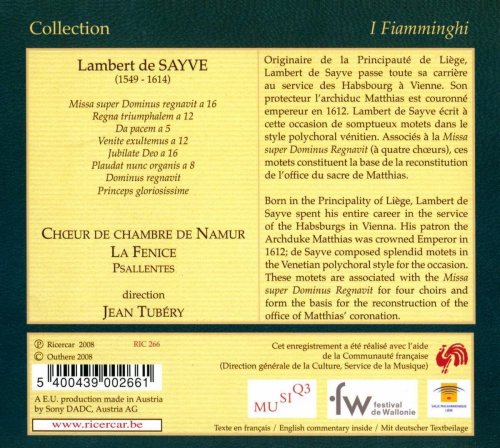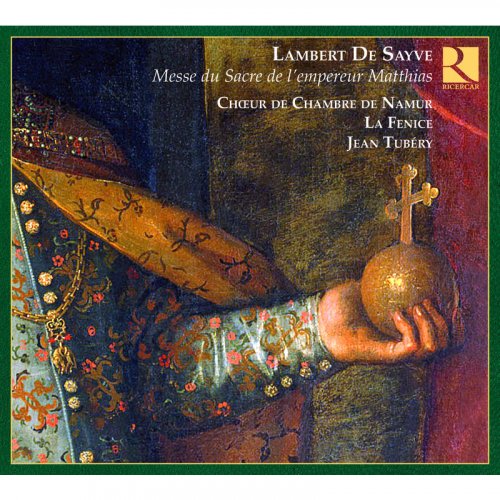
Choeur de Chambre de Namur, La Fenice, Jean Tubéry - Lambert de Sayve: Messe pour le Sacre de l'empereur Matthias (2008)
BAND/ARTIST: Choeur de Chambre de Namur, La Fenice, Jean Tubéry
- Title: Lambert de Sayve: Messe pour le Sacre de l'empereur Matthias
- Year Of Release: 2008
- Label: Ricercar
- Genre: Classical
- Quality: flac lossless
- Total Time: 00:52:32
- Total Size: 225 mb
- WebSite: Album Preview
Tracklist
01. Intrada
02. Regna triumphalem
03. Introïtus: Da pacem Domine sustinentibus
04. Sinfonia: Dominus regnavit exultet
05. Kyrie
06. Gloria in excelsis Deo
07. Graduale: Rogate aque ad pacem sunt Jerusalem
08. Alleluia: Venite exultemus
09. Da Pacem
10. Credo in unum Deum
11. Offertorio: Laudate Dominum quia benignus est
12. Jubilate Deo
13. Prefacio: Per omnia secula saeculorum
14. Sanctus & Elevatio: Sonata piano e grave per l'elevatione
15. Agnus Dei
16. Sinfonia: Princeps gloriosissime
17. Communio: Pacem meam do vobis
18. Deo Gratias: Plaudat nunc organis

Liège-born composer Lambert de Sayve hasn't made it into the rotation of frequently performed composers from the period of transition between Renaissance and Baroque, but this magnificent Belgian release will make you wonder why not. He was notable in several respects. He was virtually the last of the long procession of Netherlanders whose careers took them to the power centers of southern and central Europe: he spent most of his life serving the Habsburgs in Vienna. And what this disc shows is that he mastered the huge polychoral style coming out of Venice and took it across the Alps, well in advance of Schütz and the other composers in the German-speaking world who were influenced by it. This disc features music by a collection of Belgian musicians under the direction of brass player and leader Jean Tubéry, who here attempts a speculative reconstruction of the music de Sayve might have put together to accompany a really big political event, the coronation of Archduke Matthias as Habsburg emperor in 1612. That would have been a pull-out-the-stops affair, and Tubéry here selects pieces that were large in scale even by the standards of the glittering polychoral style. The Missa super Dominus regnavit has no fewer than 16 parts, divided into four "choirs" of four, with the word choir here meant to include both singers and instrumentalists, mostly brass players. The score of the work includes strong suggestions of the forces intended; some of the lines are texted, indicating singers, while others are left blank; those are given to the instrumentalists of La Fenice. One entire choir is marked "cappella," and this music is sung unaccompanied by Tubéry's Chamber Choir of Namur. The result is a polychoral work with an unusual and constantly evolving set of textures. The mass is, according to the practice of the time, interspersed with motets appropriate to the occasion and to the Proper segments of the observance. A few sections are sung in chant, and there are a few organ pieces, as well, but most of the Propers are also set polychorally; Tubéry guesses that this would have been an occasion on which no expense was spared. He has done a service by bringing this music into the recorded repertoire. This is a superb historical recording, with a small choir, gentle Baroque brasses, and fine sound engineering (in two different locations, but this doesn't detract from the ambiance) that reveals all the details. But it would be interesting to hear what would happen if the work was done modern-style by, say, the Canadian Brass and the Mormon Tabernacle Choir. All in all, quite something.
01. Intrada
02. Regna triumphalem
03. Introïtus: Da pacem Domine sustinentibus
04. Sinfonia: Dominus regnavit exultet
05. Kyrie
06. Gloria in excelsis Deo
07. Graduale: Rogate aque ad pacem sunt Jerusalem
08. Alleluia: Venite exultemus
09. Da Pacem
10. Credo in unum Deum
11. Offertorio: Laudate Dominum quia benignus est
12. Jubilate Deo
13. Prefacio: Per omnia secula saeculorum
14. Sanctus & Elevatio: Sonata piano e grave per l'elevatione
15. Agnus Dei
16. Sinfonia: Princeps gloriosissime
17. Communio: Pacem meam do vobis
18. Deo Gratias: Plaudat nunc organis

Liège-born composer Lambert de Sayve hasn't made it into the rotation of frequently performed composers from the period of transition between Renaissance and Baroque, but this magnificent Belgian release will make you wonder why not. He was notable in several respects. He was virtually the last of the long procession of Netherlanders whose careers took them to the power centers of southern and central Europe: he spent most of his life serving the Habsburgs in Vienna. And what this disc shows is that he mastered the huge polychoral style coming out of Venice and took it across the Alps, well in advance of Schütz and the other composers in the German-speaking world who were influenced by it. This disc features music by a collection of Belgian musicians under the direction of brass player and leader Jean Tubéry, who here attempts a speculative reconstruction of the music de Sayve might have put together to accompany a really big political event, the coronation of Archduke Matthias as Habsburg emperor in 1612. That would have been a pull-out-the-stops affair, and Tubéry here selects pieces that were large in scale even by the standards of the glittering polychoral style. The Missa super Dominus regnavit has no fewer than 16 parts, divided into four "choirs" of four, with the word choir here meant to include both singers and instrumentalists, mostly brass players. The score of the work includes strong suggestions of the forces intended; some of the lines are texted, indicating singers, while others are left blank; those are given to the instrumentalists of La Fenice. One entire choir is marked "cappella," and this music is sung unaccompanied by Tubéry's Chamber Choir of Namur. The result is a polychoral work with an unusual and constantly evolving set of textures. The mass is, according to the practice of the time, interspersed with motets appropriate to the occasion and to the Proper segments of the observance. A few sections are sung in chant, and there are a few organ pieces, as well, but most of the Propers are also set polychorally; Tubéry guesses that this would have been an occasion on which no expense was spared. He has done a service by bringing this music into the recorded repertoire. This is a superb historical recording, with a small choir, gentle Baroque brasses, and fine sound engineering (in two different locations, but this doesn't detract from the ambiance) that reveals all the details. But it would be interesting to hear what would happen if the work was done modern-style by, say, the Canadian Brass and the Mormon Tabernacle Choir. All in all, quite something.
As a ISRA.CLOUD's PREMIUM member you will have the following benefits:
- Unlimited high speed downloads
- Download directly without waiting time
- Unlimited parallel downloads
- Support for download accelerators
- No advertising
- Resume broken downloads


